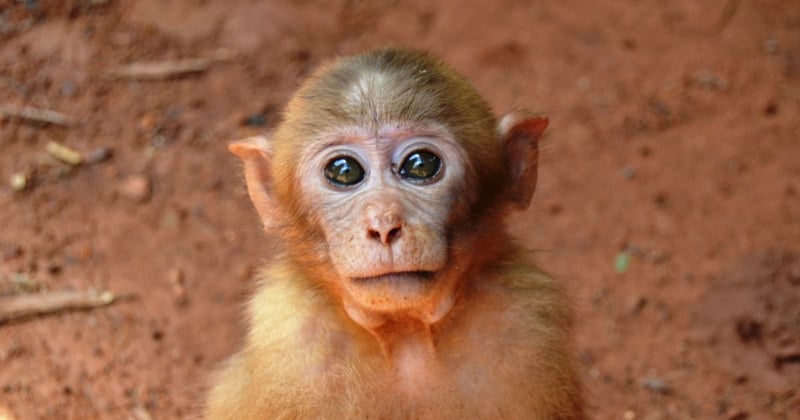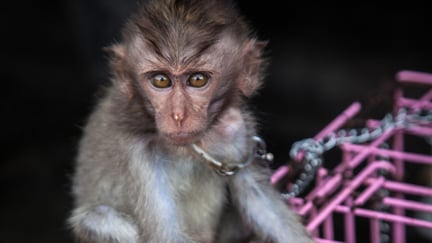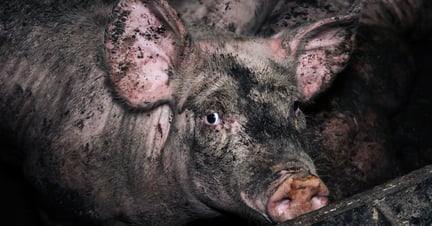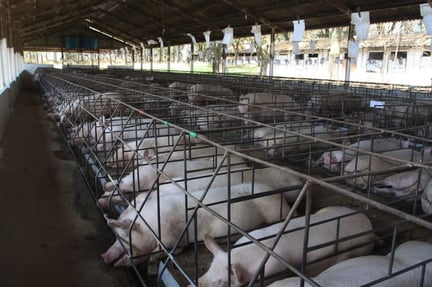
Meta’s Platform Rewards Monkey Abusers Despite Policy Violations
Press release
Nationwide - Social media giant Meta is under fire for allowing and rewarding content featuring severe primate abuse on its platform, Facebook.
Despite clear violations of Meta's policies, Facebook has failed to remove disturbing videos from pages that have been uploading extreme monkey abuse videos over the past three weeks.
The Social Media Animal Cruelty Coalition (SMACC), a group of over thirty animal protection organisations based worldwide, including World Animal Protection, said members were made aware of two public accounts sharing monkey abuse content. The content shows macaque monkeys, usually infants, being drowned, slapped, and choked. One video entitled 'Baby Learns to Swim' shows a baby macaque being forcibly submerged in water, who is struggling and at risk of drowning.
The pages collectively have over a hundred thousand followers, with many followers giving positive reactions to the abuse videos, using emojis including 'thumbs up' and 'laughing face'. Some comments seem to actively encourage physical abuse, with one saying, 'Squeeze it longer and harder until its eyes pop out'.
Since the end of March, the pages have escalated the upload of cruelty content to multiple videos per day, showing more violent abuse of monkeys.
Following the platform's process, SMACC has reported these pages and individual videos. However, Facebook has failed to take action. After reporting a video showing a baby macaque struggling to stay above water in a bucket, at risk of drowning, Facebook responded with a report stating that they had reviewed the video and decided not to remove it.
Shockingly, the platform has awarded one of the accounts a Creator Badge, a feature that promotes and incentivizes content creators to engage. According to Meta's own guidelines, the 'Creator Badge is awarded to accounts that meet quality, originality, and integrity standards'. Yet the content features violent captions like 'monkey suffocates, hardly breathes' and has a page rating of only 28%. This raises serious concerns about Meta's content moderation standards and the criteria for recognizing creators.
Furthermore, this badge requires creators to post at least one reel; a short 30-second video, per week to maintain it, effectively encouraging abusive accounts to produce and share more harmful content. By failing to enforce its policies, Meta is not only allowing animal abuse to persist on its platform but is seemingly indirectly encouraging and rewarding it.
Tricia Croasdell, CEO of World Animal Protection, said:
"The videos are vile. It is deeply disturbing that people are creating and engaging with content that clearly depicts animal abuse and cruelty. When animals are manipulated or placed in harmful situations for the sake of dramatic social media content, their welfare is severely compromised.
Meta and all social media platforms must take responsibility by shutting down these content creators and sending a clear message that animal cruelty will not be tolerated.
"They must also thoroughly review their content policies to ensure this is stopped and take action to stop animal cruelty content being uploaded in the first place. The creators are making this for financial gain - let's cut that income source off. Don't watch, don't engage, report"
This is not the first time Facebook has been under fire for monkey cruelty content on the platform. SMACC has previously found Facebook to be one of the worst platforms for animal abuse content. In their 2023 report 'The cruelty you don't see: The suffering of pet macaques for social media content', SMACC found monkey abuse videos were most commonly found on Facebook, and the most common theme of cruelty was 'deliberate physical torture.
In 2024, the BBC Three - Eye Investigations exposed a ring of monkey abuse perpetrators online, in their 'The Monkey Haters' documentary. Abusers were using platforms like Telegram to share and coordinate the abuse of macaques and exchange money. Some individuals have been prosecuted following a multinational investigation by wildlife authorities. Peter Stanley from the UK was sentenced to 20 months imprisonment after pleading guilty to three charges under the Obscene Publications Act 1959. He was convicted for uploading three videos depicting extreme animal cruelty to a Facebook group dedicated to monkey torture. Some court cases and sentencing processes are still ongoing.
Meta's existing policies explicitly prohibit content that depicts animal cruelty, yet enforcement remains inconsistent. Advocacy groups and concerned users are calling for the immediate removal of these accounts, a full review of Facebook's content moderation practices, and transparency on how abusive content continues to generate profit.
ENDS
________________________________
NOTES TO EDITORS
Evidence pack: Supporting Document Primate Content on Meta
Regarding links and images provided: We are happy to share links and images as necessary however we request that any identifying features are removed before publishing. We wish to raise awareness of the issue but not to direct people to the offending content/pages as we do not want to increase traffic and engagement. We request that no links be published, no names of pages or creators, and all images to be cropped to remove identifying features.





